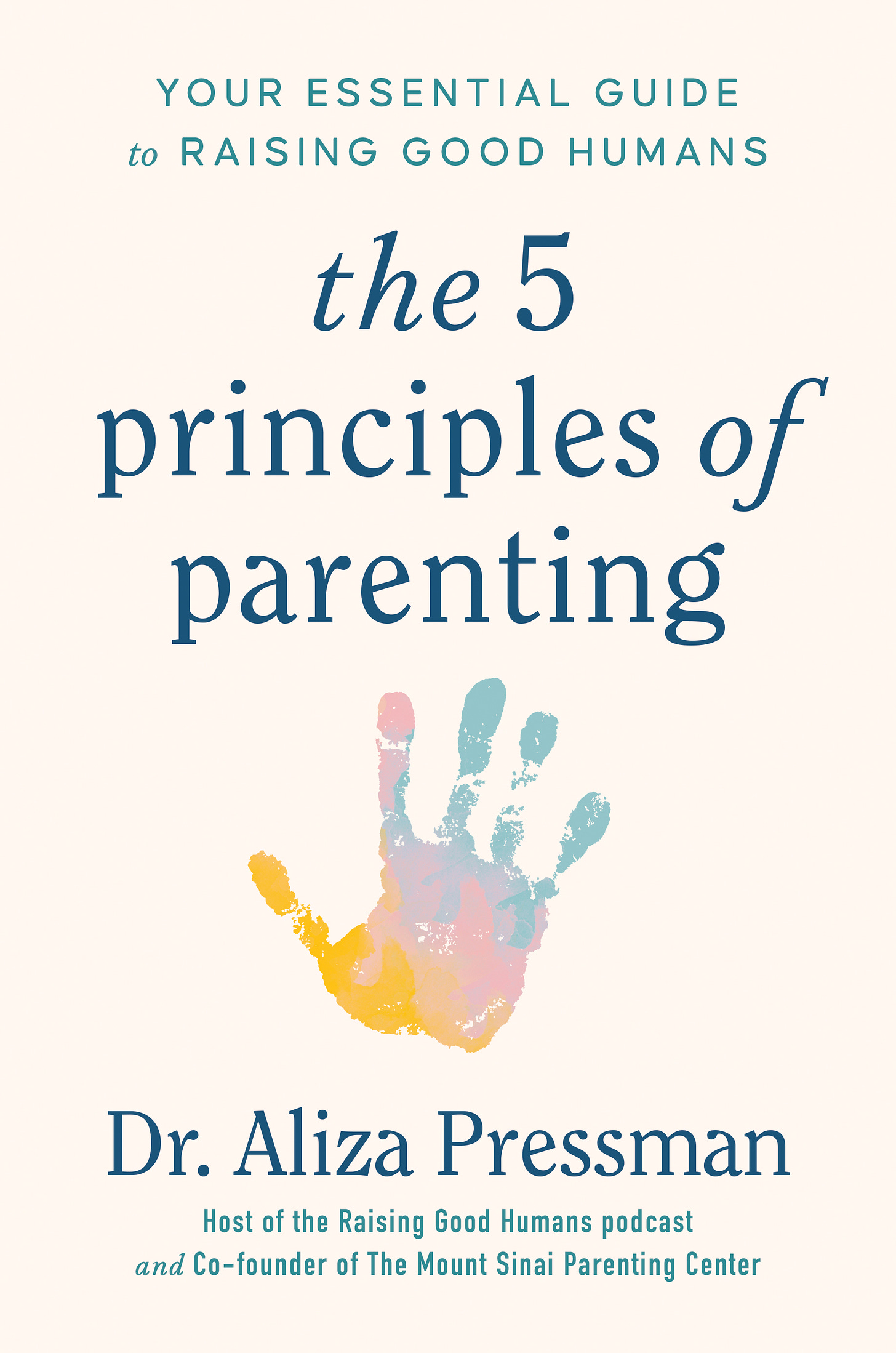Thanks for reading Raising Good Humans on Substack! My first book, The Five Principles of Parenting: Your Essential Guide to Raising Good Humans is now available for preorder here. All pre-orders will allow for access to exclusive LIVE events and will be eligible for exclusive bonus content this Fall. I am SO GRATEFUL for you and SO excited to get this book out into the world!

Happy New Year! It’s that time of year again - resolutions, intentions, and maybe some reflection. Overwhelmed yet? On this week's episode of the Raising Good Humans Podcast, my guest Kelly Corrigan and I are talking about simplifying parenting, and breaking the whirlwind of optimization culture that many of us feel trapped in.
As I have said many times before, while the parenting environment is critical to how our children grow and develop, every moment is not precious. As Kelly says, “Optimization culture makes us feel like we need to get every little note right or the symphony will fail.” That just isn’t true. Not according to the science, not according to my years in practice, and not according to the experience most of us have as parents.
I wrote my first book - coming out THIS MONTH - on five principles of parenting that help to quiet the noise and focus on what actually matters. These principles are evidence-based tools we can rely on in almost any parenting moment, and don’t require us to memorize a script.
“Who do you want to tell your problems to? Probably not someone who's going to tell you how you're supposed to be feeling, or that your feelings are wrong, or that they have the right answer for you. Instead, it’s someone who gives you the sense that whatever it is you're feeling is just what you're feeling, and it's allowed.” - Dr. Aliza Pressman
One of my favorite sentences to use in building relationships with our children is “Tell me more about that.” “Tell me more about that” (or any variation) is used by therapists, and is a great tool for parents to signal curiosity, open up discussion, and show genuine interest in who our child is and what they are thinking. Leading this way can completely change how your child feels information is received by you, and help to create a deeper and more meaningful connection between you. Who doesn’t want to feel like someone cares what they have to say, that is ready/available to listen, and wants to work to understand us? Kelly uses the term, “I know,” to convey the same sentiment. When someone delivers you a laundry list of problems, stresses, or grievances can we just pause and say, “I know”? Could you just be available to hear their distress and give your children a moment to feel validated? Is it easier than remembering what advice you’re rushing to give them, or trying to come up with something that “perfect parents” would say? Definitely. And does it help? Most certainly.
Dr. Tina Payne Bryson says one of our most important qualities as a parent is “showing up.” Emotionally, this is the equivalent of showing up for your child. Of communicating that you have the time, the space, and the interest, to let them feel. We aren’t judging, we aren’t fixing, we aren’t off telling an anecdote. We are present, connected, involved.
Our children view their own distress in the very short context of their lives. Without much experience having “done this” before, the experiences they have are REAL to them, no matter what we may think. One of the ways that we can fail our children is to belittle their feelings - “Why are you so upset about this?” - or to minimize the impact - “This isn’t a big deal.” Though the situations (at any age) may seem silly or irrelevant to us, our role as parents is to make space for how they feel experiencing them.
Even though all the facts on the ground may be the same, the main character is different, and everything's going to land differently. - Kelly Corrigan
Why are these simple phrases (“Tell me more” and “I know”) so hard for us as parents? Because somehow, somewhere, we’ve told ourselves that we need to have answers. That we need to offer solutions. That we need to attack our children’s struggles the way we would any project list. But what if being even the best project manager didn’t actually build the relationship we so desperately want to have with our child? That’s why I am so passionate about the relationship principle. Relationships are free and have deep protective power. The study of relationships has decades of science, and also deeply ancient wisdom. They matter throughout the lifespan, and they are capable of so much growth, change, and repair (hint: that’s another principle to dig into in the book!)
Let’s focus on relationships this year, not perfection. Let's dig into being present, listening, and showing up for the people who matter most. That doesn’t need to be a resolution that burdens us, but instead can be a realization that frees up some space in the day-to-day noise of parenting advice.
Learn more about why I scrap the resolutions and start making intentions, in this previous post.
A quick reminder to pre-order my first book, The Five Principles of Parenting! In it, I’m helping you to translate science into everyday challenges, and when you pre-order you get special benefits - including a virtual seminar, and custom content specifically made for you. AND when you pre-order, you are helping me SO MUCH. Every single person who pre-orders the book, helps book sellers and shops to see that demand is high and convince them to stock The Five Principles of Parenting on their shelves. I need your help to make sure that happens, and so I promise special benefits to make it worth taking the lap to pre-order today.






“Tell me more” and “I know” work with adult kids too. Just want to be able to say it more...